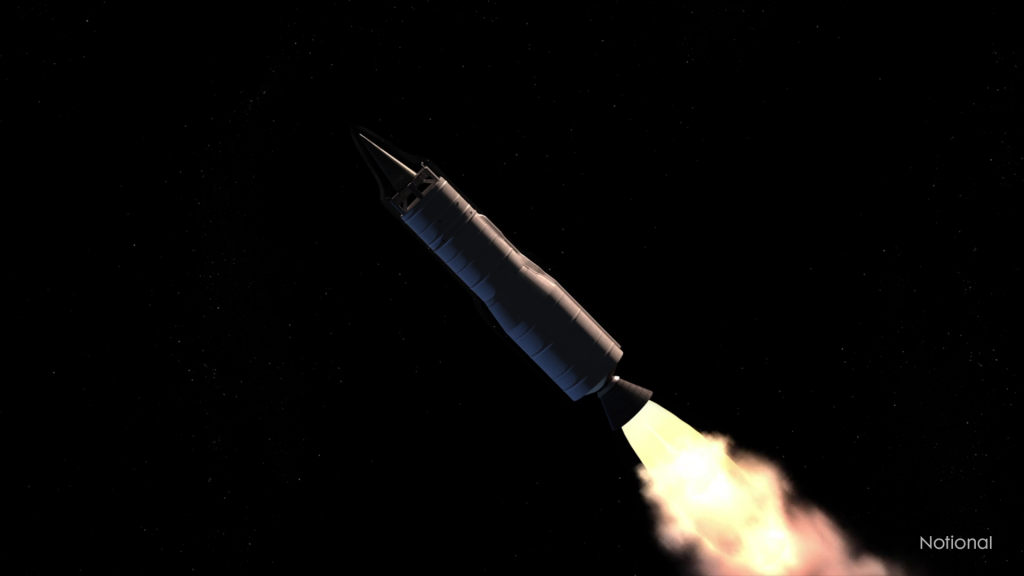
Northrop Grumman tested a stage-two solid rocket motor for the U.S. Air Force’s Sentinel Intercontinental Ballistic Missile at the Air Force Arnold Engineering Development Complex. Credit: Northrop Grumman
By Sandra Erwin,
Published by Space News, 5 August 2025
The defense contractor sees solid rocket motor capacity as key advantage
HUNTSVILLE, Ala. — Northrop Grumman executives said the company’s billion-dollar investment in solid rocket motor production facilities will pay dividends as the Pentagon scales up procurement for the Golden Dome missile defense program.
The Trump administration directed the Pentagon to develop Golden Dome as a comprehensive shield against ballistic and hypersonic threats. Led by Space Force Gen. Michael Guetlein, the program is envisioned as a layered defense architecture capable of intercepting missiles even if they are launched from other sides of the world or from space.
Northrop Grumman executives spoke Aug. 5 during a meeting with reporters on the sidelines of the Space & Missile Defense Symposium. They said the company is in a strong position to capitalize on the demand likely to be generated by Golden Dome. Solid rocket motors (SRMs) form the core propulsion technology for the vast majority of kinetic interceptor missiles that will make up the layered architecture of the Golden Dome missile shield intended to defend the U.S. homeland from missile and aerial threats.
Jim Kalberer, vice president of propulsion systems at Northrop Grumman, said the company is now producing large solid rocket motors in Utah, and smaller tactical motors in West Virginia and Maryland. These solid rocket motors range from four inches to almost 12 feet in diameter.
“Executing on Golden Dome is going to require solid rocket motor capacity for the types of the types of systems and interceptors that will be used against varying threats at varying ranges,” said Kalberer. About a billion dollars in investments at these facilities made by the company after acquiring Orbital ATK in 2018 “have positioned us very well to be ready now with capacity, with excess capacity for the needs of the systems that will be used in Golden Dome,” said Kalberer.
Competitive landscape
The solid rocket motor market consolidated significantly in recent years. The company competes head to head with L3Harris Technologies, which in 2023 acquired the nation’s other main producer of solid rocket motors, Aerojet Rocketdyne. A new player, Anduril, entered the market in 2023 and intends to challenge the duopoly. Anduril on Aug. 5 announced it opened a full rate SRM manufacturing facility in McHenry, Mississippi, where it intends to produce thousands of tactical motors by the end of 2026.
Northrop Grumman currently provides SRMs to the Pentagon for various missile defense programs. The company said it recently successfully conducted its second full-scale static test fire of a new solid rocket motor developed in less than a year, as part of the company’s Solid Motor Annual Rocket Technology Demonstrator, or SMART Demo, designed to figure out new ways to accelerate production.
Next-generation interceptors
The Trump administration has set an aggressive timeline, saying the Golden Dome will be done in three years. The system would deploy interceptors on the ground and at sea, and also space-based sensors and interceptors, marking what would be the first deployment of space-to-ground weapons in orbit.
The program has drawn comparisons to President Ronald Reagan’s Strategic Defense Initiative, known as “Star Wars,” which was never fully realized due to technical complexity and cost concerns.
With regard to Golden Dome, Northrop Grumman is touting not just its missile propulsion programs but its large portfolio of ground and naval missile defense, surveillance drones and satellite programs that could give it an edge in future Golden Dome procurement opportunities.
Raymond Sharp, Golden Dome enterprise lead for Northrop Grumman, told reporters the company is “all in.” The Trump administration “has certainly laid out a timeline that they want things quickly, so leveraging existing capabilities, some of which are ready now, say, a catalog of products that we can bring to bear,” he said.
The company intends to offer concepts for space-based interceptors, Sharp said. Northrop Grumman will tap into its expertise dating back to the Strategic Defense Initiative program, he added. Sharp declined to provide specifics on what type of space-based interceptors the company has in mind. “We have decades of history with SBI technology and designs, and so we’re leveraging that experience.”
See: Original Article




